Evgeny Saveliev
Knowledge-Informed Kernel State Reconstruction for Interpretable Dynamical System Discovery
Jan 29, 2026Abstract:Recovering governing equations from data is central to scientific discovery, yet existing methods often break down under noisy, partial observations, or rely on black-box latent dynamics that obscure mechanism. We introduce MAAT (Model Aware Approximation of Trajectories), a framework for symbolic discovery built on knowledge-informed Kernel State Reconstruction. MAAT formulates state reconstruction in a reproducing kernel Hilbert space and directly incorporates structural and semantic priors such as non-negativity, conservation laws, and domain-specific observation models into the reconstruction objective, while accommodating heterogeneous sampling and measurement granularity. This yields smooth, physically consistent state estimates with analytic time derivatives, providing a principled interface between fragmented sensor data and symbolic regression. Across twelve diverse scientific benchmarks and multiple noise regimes, MAAT substantially reduces state-estimation MSE for trajectories and derivatives used by downstream symbolic regression relative to strong baselines.
Towards Human-Guided, Data-Centric LLM Co-Pilots
Jan 17, 2025Abstract:Machine learning (ML) has the potential to revolutionize healthcare, but its adoption is often hindered by the disconnect between the needs of domain experts and translating these needs into robust and valid ML tools. Despite recent advances in LLM-based co-pilots to democratize ML for non-technical domain experts, these systems remain predominantly focused on model-centric aspects while overlooking critical data-centric challenges. This limitation is problematic in complex real-world settings where raw data often contains complex issues, such as missing values, label noise, and domain-specific nuances requiring tailored handling. To address this we introduce CliMB-DC, a human-guided, data-centric framework for LLM co-pilots that combines advanced data-centric tools with LLM-driven reasoning to enable robust, context-aware data processing. At its core, CliMB-DC introduces a novel, multi-agent reasoning system that combines a strategic coordinator for dynamic planning and adaptation with a specialized worker agent for precise execution. Domain expertise is then systematically incorporated to guide the reasoning process using a human-in-the-loop approach. To guide development, we formalize a taxonomy of key data-centric challenges that co-pilots must address. Thereafter, to address the dimensions of the taxonomy, we integrate state-of-the-art data-centric tools into an extensible, open-source architecture, facilitating the addition of new tools from the research community. Empirically, using real-world healthcare datasets we demonstrate CliMB-DC's ability to transform uncurated datasets into ML-ready formats, significantly outperforming existing co-pilot baselines for handling data-centric challenges. CliMB-DC promises to empower domain experts from diverse domains -- healthcare, finance, social sciences and more -- to actively participate in driving real-world impact using ML.
Contextual HyperNetworks for Novel Feature Adaptation
Apr 12, 2021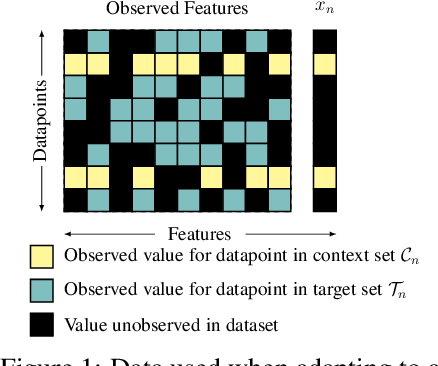


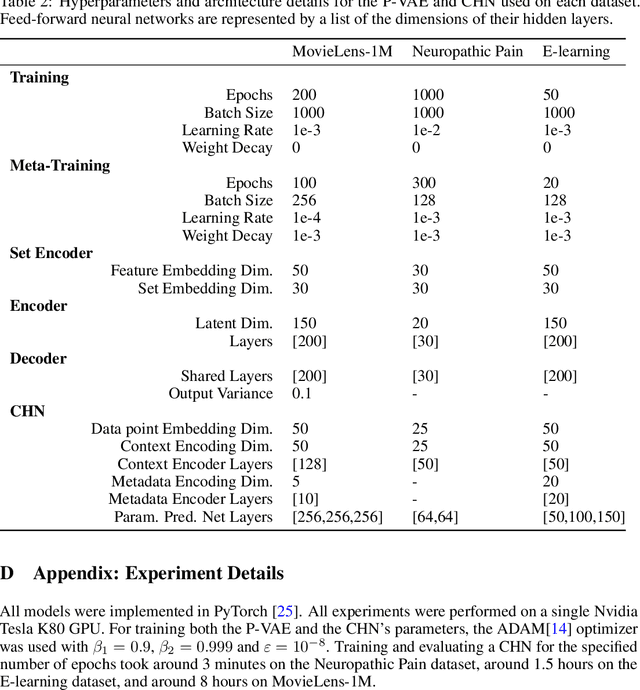
Abstract:While deep learning has obtained state-of-the-art results in many applications, the adaptation of neural network architectures to incorporate new output features remains a challenge, as neural networks are commonly trained to produce a fixed output dimension. This issue is particularly severe in online learning settings, where new output features, such as items in a recommender system, are added continually with few or no associated observations. As such, methods for adapting neural networks to novel features which are both time and data-efficient are desired. To address this, we propose the Contextual HyperNetwork (CHN), an auxiliary model which generates parameters for extending the base model to a new feature, by utilizing both existing data as well as any observations and/or metadata associated with the new feature. At prediction time, the CHN requires only a single forward pass through a neural network, yielding a significant speed-up when compared to re-training and fine-tuning approaches. To assess the performance of CHNs, we use a CHN to augment a partial variational autoencoder (P-VAE), a deep generative model which can impute the values of missing features in sparsely-observed data. We show that this system obtains improved few-shot learning performance for novel features over existing imputation and meta-learning baselines across recommender systems, e-learning, and healthcare tasks.
How Faithful is your Synthetic Data? Sample-level Metrics for Evaluating and Auditing Generative Models
Feb 17, 2021



Abstract:Devising domain- and model-agnostic evaluation metrics for generative models is an important and as yet unresolved problem. Most existing metrics, which were tailored solely to the image synthesis setup, exhibit a limited capacity for diagnosing the different modes of failure of generative models across broader application domains. In this paper, we introduce a 3-dimensional evaluation metric, ($\alpha$-Precision, $\beta$-Recall, Authenticity), that characterizes the fidelity, diversity and generalization performance of any generative model in a domain-agnostic fashion. Our metric unifies statistical divergence measures with precision-recall analysis, enabling sample- and distribution-level diagnoses of model fidelity and diversity. We introduce generalization as an additional, independent dimension (to the fidelity-diversity trade-off) that quantifies the extent to which a model copies training data -- a crucial performance indicator when modeling sensitive data with requirements on privacy. The three metric components correspond to (interpretable) probabilistic quantities, and are estimated via sample-level binary classification. The sample-level nature of our metric inspires a novel use case which we call model auditing, wherein we judge the quality of individual samples generated by a (black-box) model, discarding low-quality samples and hence improving the overall model performance in a post-hoc manner.
Diagnostic Questions:The NeurIPS 2020 Education Challenge
Aug 03, 2020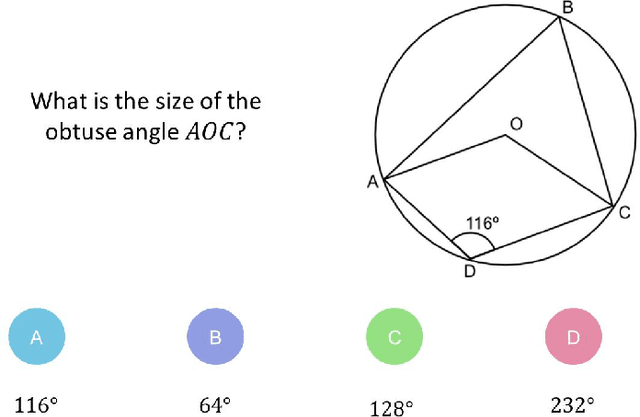

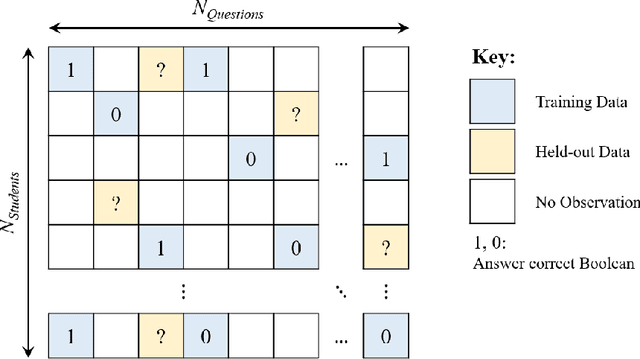
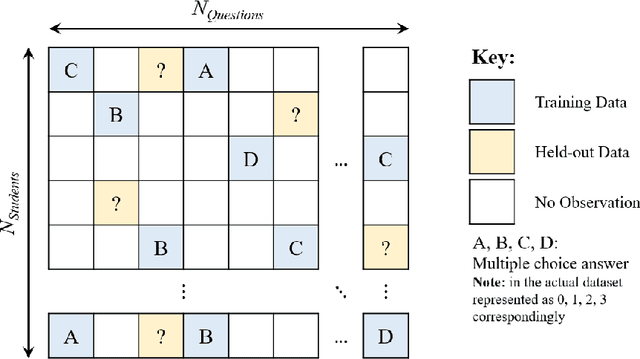
Abstract:Digital technologies are becoming increasingly prevalent in education, enabling personalized, high quality education resources to be accessible by students across the world. Importantly, among these resources are diagnostic questions: the answers that the students give to these questions reveal key information about the specific nature of misconceptions that the students may hold. Analyzing the massive quantities of data stemming from students' interactions with these diagnostic questions can help us more accurately understand the students' learning status and thus allow us to automate learning curriculum recommendations. In this competition, participants will focus on the students' answer records to these multiple-choice diagnostic questions, with the aim of 1) accurately predicting which answers the students provide; 2) accurately predicting which questions have high quality; and 3) determining a personalized sequence of questions for each student that best predicts the student's answers. These tasks closely mimic the goals of a real-world educational platform and are highly representative of the educational challenges faced today. We provide over 20 million examples of students' answers to mathematics questions from Eedi, a leading educational platform which thousands of students interact with daily around the globe. Participants to this competition have a chance to make a lasting, real-world impact on the quality of personalized education for millions of students across the world.
 Add to Chrome
Add to Chrome Add to Firefox
Add to Firefox Add to Edge
Add to Edge